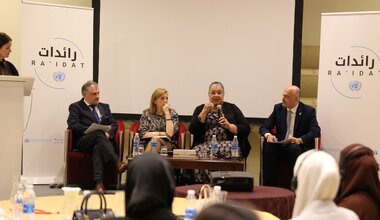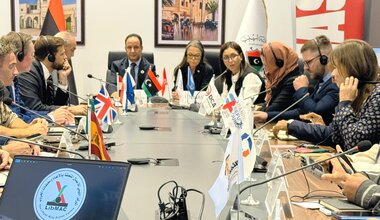UN Special Representative Mitri Address to Forum on "Human Rights in Constitutions" 18 December 2013
 |
| Special Representative of the Secretary General Tarek Mitri addresses a forum on human rights organized by the Human Rights Committee of the General National Congress and UNSMIL (Iason Athanasiadis/UNSMIL) |
First Vice President of the General National Congress,
President of the Human Rights Commission of the General National Congress
Members of the General National Congress,
Distinguished guests,
It gives me pleasure to join you today to celebrate the International Human Rights Day, which is organized by the Human Rights Committee of the General National Congress in cooperation with Human Rights, Transitional Justice and Rule of Law Division of the United Nations Support Mission in Libya (UNSMIL) under the title “Human Rights in Constitutions.” As you know, the Universal Declaration of Human Rights was adopted on this day in 1948. This is why we mark it every year, not only to identify it as a reference text, but because it has become, in the eyes of many, the bearer of common human values allowing us to evaluate positions and practices related to human liberties and peoples’ dignity. Today also coincides with the twentieth anniversary of the Vienna Declaration that was adopted at the World Conference on Human Rights in 1993, which is considered a landmark on an ongoing and long path.
Constitutional guarantees of human rights assumes a great importance during this phase of Libyan history, for Libyans are still struggling with the heavy legacy of four decades that witnessed continuing and systematic human rights violations. And here they are today reaping the fruits of a revolution that forced out their freedom from the hands of oppressors, albeit without completely healing their wounds. This will not be achieved except with the laying of solid foundations for a modern Libyan state that respects human rights, establishes the rule of law and achieves national reconciliation through truth and accountability.
To be sure, the GNC’s adoption of the Transitional Justice Law, which followed the enactment of the Law on the Criminalization of Torture, Forced Disappearance and Discrimination, is considered an important step on this path. However, we all know that Libyans aspire to see these laws put into practice, requiring additional efforts to identify mechanisms and measures for their implementation. We stand ready to offer technical advice in support to such efforts.
On a related matter, I welcome the reconciliations that are taking place in some of the Libyan cities, and I make special mention of the release of a number of detainees, as was the case recently in Al-Zawiyah, where dozens of detainees were released including some members of the Social Council of Worfallah tribes. We are hopeful that this release will open the door to the release of large numbers of detainees or their referral to a due judicial process as stated by the Transitional Justice Law.
Friends,
The respect for human rights has become a key criterion for judging states, and one of the most important conditions for them to earn the respect among nations. This has led such states to establish independent national organizations for human rights that receive the support of the state while maintaining their independence. Libya has become one of those states upon the establishment of the National Council for Public Liberties and Human Rights, which has achieved significant progress during the last year, and for that it is to be commended and supported.
On the other hand, the dynamic forces of the society, with their organizations and activists, contribute greatly to the building of a state build on the rule of law and protection of civil liberties. No doubt freedom in Libya has enabled the emergence of many organizations that are committed to spread human rights awareness and culture in society, in addition to their engagement in the monitoring and revealing of violations taking place in illegal detention facilities. Such forces, who are still in their infancy, deserve attention and support.
Ladies and gentlemen,
It has become a common practice for human rights to occupy a befitting status within constitutions, for constitutions are but a social contract that is based on common values that define the national self-understanding. It is not strange that Libyans have adopted this path while they prepare for the launch of the new constitutional process. In this new constitution we see the picture of the new Libya. However, such picture will not be complete until human rights are upheld and their respect is guaranteed in all aspects of the national life. The inclusion of human rights clauses in the new constitution may well constitute one of the corner stones of the new Libyan state. This constitution will be fully meaningful if it is the manifestation of a national consensus. Such consensus should motivate a wide section of Libyan society, in thought and practice, to commit to the objectives of their revolution against tyranny, which is the other face of depriving citizens from their civil and political rights. This consensus should be achieved in the coming months through revision of practices and reflections on experiences. For it should not be instantaneous, nor should it be the result of the work of experts, but the end result of a long process that involves preparation and follow-up, and that expresses the aspirations of a wide section of citizens, stemming from their sufferings and experiences as well as their commitments.
What remains is a plea for efforts to consolidate, without delay or obstruction, and for God to bring your endeavors into fruition. May God keep Libya free and proud.
Peace be upon you.
 United Nations Peacekeeping
United Nations Peacekeeping UN
UN







